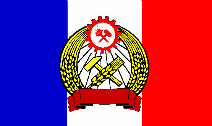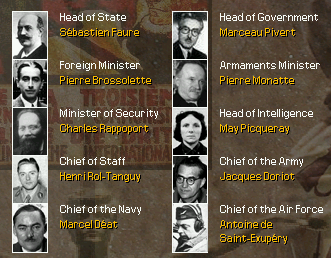Commune of France
From Kaiserreich
| ||||
| Motto Prolétaires de tous les pays, unissez-vous! (Workers of the world, unite!) | ||||
| Anthem L'Internationale | ||||

| ||||
| Official Language | French | |||
| Capital | Paris | |||
| Head of State | Sébastien Faure | |||
| Head of government | Marceau Pivert | |||
| Establishment - Proclaimation of the Federation of Communes | 22 June 1920 | |||
| Government | Socialist federal republic | |||
| Currency | Franc | |||
| Area | Less than 500.000 km² | |||
| Population | Around 40 million | |||
The Commune of France, or officially Federation of Communes of France (in French: Fédération des Communes de France), is a country in Western Europe. It is bordered to the North by the English Channel; to the East by Flanders-Wallonia, Germany, Switzerland and the Italian Federation; to the South by the Mediterannean Sea and Spain; and to the West by the Atlantic Ocean.
The Commune of France is a socialist and syndicalist federal republic composed of the 36,000 communes of France and ruled by a dual structure, with the legislative powers going to the Bourse Générale du Travail (General Labor Council) and executive to the Comité de Salut Public (Commitee of Public Safety), which in turn was proclaimed on June, 22 1920, after the French Civil War. The French government in exile, established in Northern Africa, refuses to acknowledge the Commune as the righteous French government, and vice versa.
Contents |
History
The Third Republic ended in the way it began: defeated by German arms, and facing Communist Revolution at home. In the November of 1919 a revolutionary General Strike was called by the CGT, paralysing the country and causing the downfall of the bourgeois government. ‘The Party of Order’ was not strong enough to put an end to the unrest and in the following months the ‘Establishment’ were forced out of France by a coalition of leftist forces in a brief but brutal civil war. For the past 15 years the self styled ‘Commune of France’ has united behind a common platform of Syndicalist-Socialist consensus, headed by the ruling Comit? de Salut Public. However, by 1936 the consensus that was resolved to rebuild the shattered country and defend the fruits of revolution from foreign menace is deemed as outdated by many critics, and there is a growing call for more radical policies. France is increasingly confident in its security and in its mission, but the French revolutionary tradition is varied, and it is unclear precisely which strands shall become dominant in the years to come…
Politics
|
Chairman of the Bourse Générale du Travail: Sébastien Faure (Anarchist, born 6 January 1858)
Chairman of the Comité de Salut Public: Marceau Pivert (Travailleur, born 2 October 1895)
Delegate to Foreign Affairs: Pierre Brossolette (Travailleur, born 25 June 1903)
Delegate to Economic Affairs: Pierre Monatte (Travailleur, born 15 January 1881)
Delegate to Internal Security: Charles Rappoport (Travailleur, born 14 June 1865)
Director of Services de Renseignements Généraux: May Picqueray (Anarchist, born 8 July 1898)
Chief of the General Staff of the Communal Army: General Henri Rol-Tanguy (Anarchist, born 12 June 1908)
Commander of Communal Ground Forces: General Jacques Doriot (Sorelian, born 26 September 1898)
Commander of Communal Navy: Marcel Déat (Jacobin, born 7 March 1894)
Commander of Communal Air Force: Antoine de Saint-Exupéry (Travailleur, born 29 June 1900)
The Commune of France is of a primarily Syndicalist construction, based around federated union organisations which emphasise worker control on an industry-by-industry basis. The CoF is in fact a federation of major cities, such as Paris, Lyon, Marseille, Bordeaux and Toulouse, each one ruled by a Bourse du Travail (labour council) which is directly elected by the citizens of the regional commune. The task of the Bourse du Travail is to manage not only the general affairs of local government, but also local military arrangements in the form of the popular militia.
The Chairman of the Commune is elected directly by the citizens, and confirmed in their appointment by the Comité de Salut Public (rejection by the Comité demands a new election be held). The Chairman (currently the anarchist Sébastien Faure) is the Head of State, as well as leader of the Bourse Générale du Travail - which functions as a form of Parliament, representing the individual Communes that make up the adminstrative structure of Syndicalist France. The BGT is primarily responsible for forming a bridge between the national executive (CSP) and the local governments.
The CSP takes decisions at the national level, "uniting the efforts of the Communes", directing foreign affairs and organising the Garde Nationale (the professional element of the CoF's army). It too is elected by the general populace (though on the positionary basis that they must secure the support of a regional Bourse, via caucus, to make the short-list). The current Premier of the Comité de Salut Public is the Travailleur Marceau Pivert, who succeeded Pouget in 1931, following a turbulent election that lead to a government of compromise.
Whilst the Commune of France claims to be fully decentralized, and fully endorses free elections to both the BGT and local Bourses as fundamental to democracy, the fact is that the CGT holds a position so dominant that her rivals have not seriously been able to challenge her rule since the Fourth Republic's foundation (managing at best to put the CGT in the position of a minority government), and the CSP remains by far the most powerful institution in the country. However, the CGT is not of a uniform opinion, and is in fact divided into several "camps" of opinion.
Political Factions
In 1925 a powerful group was born, known as Travailleurs (Workers), inspired by the British system established after the successful British revolution. The Travailleurs specifically desire an extension of democracy by adopting many British constitutional arrangements, and though they have found strong allies in the Anarchists in their aim of reducing the CSP's power, they fundamentally disagree on the question of local government (as Socialists they would prefer the Bourses to be split from the Unions). They head the current government of compromise.
The Sorelians take their name and some inspiration from the theories of French anarcho-syndicalist thinker Georges Sorel, and can be seen as the "orthodoxy" of Syndicalism. The Sorelians (a minority in the CGT) feel that the CSP was neccessary only to ensure the successful establishment of the revolutionary state in it's transition from a capitalist to a syndicalist economy, and that the time has now come to hand national power from the CSP to the BGT, forging a more centralized state. They are currently lead by Georges Valois.
Outside the CGT remain the Jacobins, inspired by Lenin's brand of Communism as well as French revolutionary history. They desire that their tightly knit and structured party rid France of its anarchistic and syndicalist characteristics and form a "vanguard" to lead a Communist reconstruction.
There is also an Anarchiste (or Anarchiste Pur - Pure Anarchist) movement which takes both inspiration and "leadership" from the exiled Ukrainian revolutionary Makhno. Often considered an eccentric element of French political life, the Anarchiste movement campaigns for greater regional freedom in the make-up and constitution of local government, and a drastic cut in the legislative role of the CSP.
The Radical Liberals who boycotted Parliament with the Socialists in 1919 have largely been forced to emigrate as a result of persecution and victimization lead by Jacobin extremists.
In 1936 elections are about to begin within the CSP and one third of the BGT - to elect for example the delegates for the army, foreign affairs, treasury, and of course the Premier. With Pivert considered "too weak" even by his own followers, the continuation of the CGT's political dominance can no longer be assured, and France looks to be standing at a crossroads.
Military
The Army
During the early years of the Commune, people's militia formed the bulk of the army as a professional army was seen as "anti-revolutionary" and "an enemy of the people's freedom". The Swiss Army was studied closely and the communes modelled their militia units on the basis of the Swiss cantonal troops. Weapons are kept in the central storage of the local commune (Délégation Générale pour l'Armement or the General Weaponry Delegation is responsible for the upkeep of these storages), where all members of the militia will gather should they be called to arms. Some communes (mainly the ones bordering Germany and Flanders) are recquired to keep their militias armed and ready at all times. This has led to the first standing army units being formed and trained in the border regions. The armoured reserve is stationed in Paris and is under the direct control of the Chef des Armées. L'Armée Populaire de la Commune de France has modern equipment and is largely motorized. However, organization and co-operation with other branches of the military is a problem.
The Navy
During the civil war, the French navy was divided as was the rest of the nation. There were some engagements between the nationalist and the syndicalist naval units, but most of the ships remained in their ports as fuel was scarce and the crews divided. After the civil war, the ships that followed the nationalists into Africa formed the Marine Nationale anew and the ships that stayed in France were the backbone of the new Marine de libération du peuple. The navy has two main fleets, the Flotte de la Patrie in Marseilles and Flotte de la Normandie in Brest. The navy was severely weakened during the civil war and not much emphasis has been put into building new ships for the navy. The main purpose of the navy is to prevent landings into the southern and northern coasts(and the navy is such targeted quite solely against Germany and National France). Marine libération du peuple has potential, but is currently incapable of promoting the Commune's intrests abroad.
The Air Force
The Armée de l'Air du peuple is the air arm of the Armées françaises. The aerial aspect of war was closely studied by the Commune's military minds after the civil war and has lead to a strong, medium-sized air force with modern equipment and well-trained pilots. Innovative generals like Antoine de Saint-Exupéry have developed organization and tactics for the air force and during a conflict the Commune's air force can be expected to cause significant damage to the enemy.
Foreign relations
Commune of France is the leader of the Syndicalist Internationale and maintains good relations with almost all socialist countries and major socialist movements (such as the CNT-FAI) around the world.
Very good relations with Socialist Republic of Italy and Union of Britain.
Friendly relations with Mexico, Georgia and Bharitya Commune.
Unfriendly relations with Flanders-Wallonia, Italian Federation, Switzerland, Kingdom of Spain and Canada.
Declared hostility against the French government in exile, Germany and Austria-Hungary.
Culture
One could say the French culture has gained some and lost some after the civil war. Old masterpieces of art and music are labelled as "bourgeois" and "anti-revolutionary" and are banned from public display by many labour councils. However, new art-forms such as surrealism have flourished, fueled by the bohemian art-circles of Paris and other major cities. Cuisine remains relatively unaltered, but the visual art forms have gone through a revolution of sorts. Film, radio and many other inventions are being used extensively as means of providing cultural experiences for the masses.


